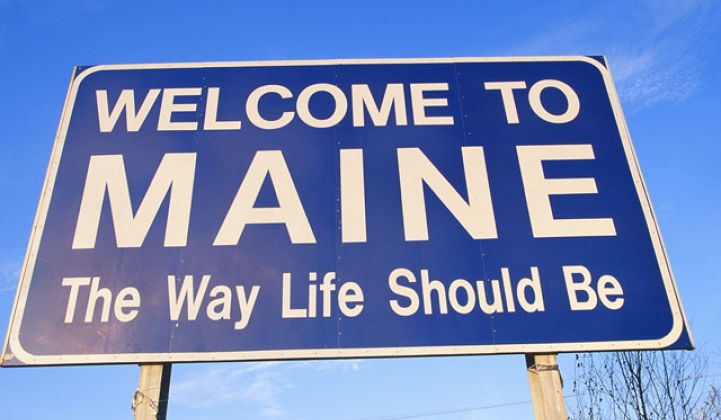The Maine Public Utilities Commission has approved a measure to roll back retail-rate net metering and move to a buy-all, sell-all arrangement beginning on January 1, 2018.
Under the new rate structure approved Tuesday, distributed solar customers will have to sell 100 percent of the energy they produce to the utility on one rate, and then buy back 100 percent of the energy they need from the utility on another, higher rate.
Customers who install solar starting in 2018 will see the credit they receive on the transmission and distribution portion of their electric bill decrease by 10 percent each year over 10 years. Based on today’s electricity prices, solar advocates say the change would reduce the value proposition of rooftop solar from a credit of 14 cents per kilowatt-hour today, to a credit of 6 cents per kilowatt-hour at the end of the decade.
Existing solar customers will be allowed to stay on the current net metering rate for up to 15 years. Customers that install solar between now and January 1, 2018 will also be grandfathered in on the current credit rate.
The net metering policy review was triggered last year when Central Maine Power reported that distributed solar customers hit 1 percent of the utility’s peak load.
According to the Northern New England Solar Industry Alliance, a new coalition formed by Sunrun and ReVision Energy, the largest solar provider in Maine, over the past six months approximately 400 Mainers have submitted public comments to the commission asking them to retain net metering.
“It is clear [the PUC] didn’t carefully consider the comments filed,” said Chris Rauscher, director of public policy for Sunrun. The San Francisco-based solar installer does not currently work in Maine but is active in supporting favorable solar policies across the country.
In addition to the net metering changes, Rauscher said the PUC’s new measure removed positive changes for the community solar sector. A draft rule lifted the cap on the number of customers that could participate in a particular community solar project and lifted the cap on the overall size of the community solar array. But those provisions did not make the final cut.
Distributed solar advocates are now looking to the state legislature for support. About a dozen bills have been filed related to solar policy in Maine, according to Rauscher. State Rep. Seth Berry is proposing a bill that would preserve net metering in statute, reduce barriers to community solar projects, and re-establish a solar rebate program.
“The rule adopted today by the PUC seems to take us in the wrong direction,” Berry said in a statement on Tuesday. “This rulemaking only underscores the need for the legislature to move quickly to protect jobs, ensure market stability and keep Mainers in control of their energy future.”
Meanwhile, Maine Gov. Paul LePage has strongly opposed favorable solar policies. LePage has long called for the elimination of net metering and vetoed a compromise bill last year that would have added 248 megawatts to Maine’s nascent solar market over five years.
“Other ratepayers should not be subsidizing those installations to make solar viable,” LePage said in a statement this week. “If it cannot stand on its own two feet, they should not have to pay higher rates to some of the more affluent ratepayers”
LePage’s comments contradict a study that found solar produces a measurable benefit for all Mainers. In 2015, the Maine Public Utilities Commission commissioned a value-of-solar study that found the value of distributed solar in Maine is worth 33 cents per kilowatt-hour -- more than double the current credit distributed solar customers receive.
The study assumed solar systems with a 25-year warranty and 35-year expected lifespan. One of the major benefits of solar, according to the study, is the ability to offset natural-gas imports to the state. Maine spends about $5 billion per year on imported fossil fuels.
As Maine regulators seek to move away from net metering, regulatory staff in New Hampshire have proposed leaving the policy in place as the commission gathers more information on the policy’s impact. Staff wrote in a recent testimony that new solar customers should continue to qualify for retail-rate net metering with the exception that they must also pay certain non-bypassable charges “such as the systems benefits charge, stranded cost recovery charge, storm recovery surcharges, and state electricity consumption tax.”
Because solar penetration in New Hampshire is still under 1 percent, staff recommended that the current net metering policy be left in place until a replacement is approved. Further review of net metering could take place through a new proceeding launched when there is sufficient data available to complete an avoided-cost study, or when solar penetration reaches 10 percent of New Hampshire’s total aggregate peak demand, or after a certain period of time.
The New Hampshire net metering docket is expected to be settled in June.



